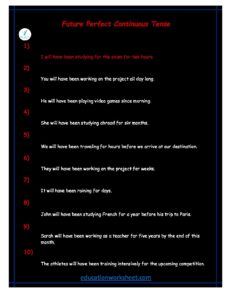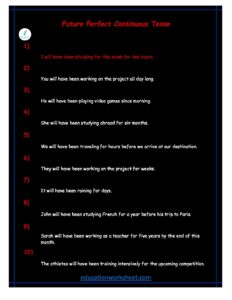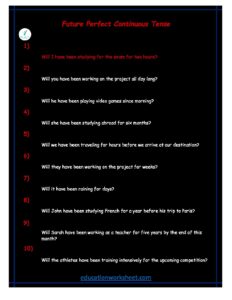how to converting Future Perfect Tense positive sentences to interrogative form
how to converting Future Perfect Tense positive sentences to interrogative form
The English language is rich and versatile, offering a variety of tenses to express different shades of meaning. One such tense is the Future Perfect Tense, which is used to describe actions or events that will be completed at a specific point in the future. It is a tense that adds depth and precision to our communication. In this discussion, we will explore the Future Perfect Tense and its transformation from positive statements to interrogative forms. We will delve into the rules and examples that guide this transformation, equipping you with a comprehensive understanding of how to construct interrogative sentences in the Future Perfect Tense.
Understanding the Future Perfect Tense

Before we embark on the journey of converting Future Perfect Tense positive sentences to interrogative form, let’s first ensure that we have a clear grasp of what the Future Perfect Tense entails. The Future Perfect Tense is used to express an action or event that will have been completed in the future before another action or time in the future. It is formed by combining “will have” with the past participle form of the main verb.
The basic structure of a positive sentence in the Future Perfect Tense is as follows:
[Subject] + will have + [past participle verb] + [complement]
For example:
- She will have finished her work by 5 PM.
- They will have graduated from college next year.
- I will have completed the project by the time you arrive.
In each of these sentences, the Future Perfect Tense is used to convey the idea that the actions (finishing work, graduating, completing the project) will be completed before a specific point in the future.
Converting to Interrogative Form

Now, let’s move on to the main topic of discussion: converting positive sentences in the Future Perfect Tense to interrogative form. An interrogative sentence is one that asks a question. To transform a positive sentence in the Future Perfect Tense into an interrogative one, you need to make a few key adjustments to the sentence structure.
The Basic Structure
The basic structure of an interrogative sentence in the Future Perfect Tense is as follows:
[Auxiliary verb] + [subject] + [will] + [have] + [past participle verb] + [complement] + [question word] + [rest of the sentence] + ?
Here, the “auxiliary verb” is typically the modal auxiliary verb “will.” The “question word” is used to seek specific information, and the rest of the sentence typically includes the subject and any additional information required to form a complete question.
Example Conversions
To illustrate this transformation, let’s take the positive sentences mentioned earlier and convert them into interrogative form:
- Positive: She will have finished her work by 5 PM. Interrogative: Will she have finished her work by 5 PM?
- Positive: They will have graduated from college next year. Interrogative: Will they have graduated from college next year?
- Positive: I will have completed the project by the time you arrive. Interrogative: Will I have completed the project by the time you arrive?
In each of these interrogative sentences, we’ve placed the modal auxiliary verb “will” at the beginning of the sentence, followed by the subject. This is a common structure for forming questions in the Future Perfect Tense.
Using Question Words
Question words such as “what,” “where,” “when,” “why,” “how,” and “who” can be used to ask more specific questions in the Future Perfect Tense. The placement of the question word depends on the information you want to inquire about.
Let’s consider some examples using question words:
- Positive: You will have visited many countries by the end of the year. Interrogative (What): What countries will you have visited by the end of the year?
- Positive: They will have completed the marathon in under three hours. Interrogative (How): How long will they have taken to complete the marathon?
- Positive: She will have written a book on that topic. Interrogative (Why): Why will she have written a book on that topic?
By incorporating question words, you can create interrogative sentences that seek specific details or reasons related to the actions or events in the Future Perfect Tense.
Subject-Verb Agreement
It’s essential to maintain subject-verb agreement when constructing interrogative sentences. The auxiliary verb “will” remains the same, but the main verb is always in its base form. Whether the subject is singular or plural, the form of the verb remains consistent.
Examples of subject-verb agreement in interrogative sentences:
- Will she have finished her work by 5 PM?
- Will they have graduated from college next year?
- Will I have completed the project by the time you arrive?
- What countries will you have visited by the end of the year?
- How long will they have taken to complete the marathon?
- Why will she have written a book on that topic?
In each case, the verb “will” remains the same, and the main verb is in its base form (e.g., “finished,” “graduated,” “completed,” “visited,” “taken,” “written”).
Use of the Auxiliary “Have”
In the Future Perfect Tense, “have” is used in the construction of both positive and interrogative sentences. It is essential to retain “have” in its proper position when converting a positive sentence to interrogative form.
Examples illustrating the use of “have” in interrogative sentences:
- Will she have finished her work by 5 PM?
- What countries will you have visited by the end of the year?
The placement of “have” after “will” in the interrogative form is consistent with its position in positive sentences. The auxiliary “have” is a crucial element in indicating the completion of an action or event in the future.
Intonation and Question Mark
When speaking or writing interrogative sentences in the Future Perfect Tense, it’s important to use the appropriate intonation. In spoken language, the pitch of your voice typically rises at the end of an interrogative sentence to signal that it is a question. In written language, a question mark “?” is used at the end of the sentence to indicate that it is an interrogative question.
For example, when asking the question “Will she have finished her work by 5 PM?” in conversation, you would raise your voice slightly at the end to convey that it is a question. In written form, the sentence would end with a question mark: “Will she have finished her work by 5 PM?”
Additional Examples
Let’s explore more examples to solidify our understanding of converting Future Perfect Tense positive sentences to interrogative form:
- Positive: He will have bought a new car. Interrogative: Will he have bought a new car?
- Positive: They will have completed their assignments. Interrogative: Will they have completed their assignments?
- Positive: I will have saved enough money. Interrogative: Will I have saved enough money?
- Positive: She will have cooked dinner. Interrogative (What): What will she have cooked for dinner?
- Positive: We will have met our deadline. Interrogative (How): How will we have met our deadline?
- Positive: The project will have reached its conclusion. Interrogative (Why): Why will the project have reached its conclusion?
These examples demonstrate the conversion of positive sentences into interrogative ones, using various question words to elicit specific information or reasons.
how to converting Future Perfect Tense positive sentences to interrogative form

Practice Makes Perfect
Converting Future Perfect Tense positive sentences to interrogative form may seem challenging at first, but like any language skill, it becomes more natural with practice. Here are some tips to help you master this transformation:
- Familiarize yourself with the basic structure of both positive and interrogative sentences in the Future Perfect Tense.
- Understand the role of question words and how they can be used to ask different types of questions.
- Pay attention to subject-verb agreement and the consistent use of the auxiliary “will” and the base form of the main verb.
- Practice by creating your own positive sentences in the Future Perfect Tense and then converting them to interrogative form.
- Listen to or read examples of interrogative sentences in the Future Perfect Tense to get a feel for the appropriate intonation and use of question marks.

